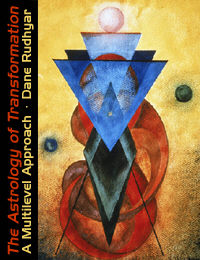 |
| Home | Bio | Art | Music | Literature | Civilization & Culture | Philosophy of Wholeness | Theosophy & Spirituality | Astrology |

CHAPTER THREE
Four Levels of Interpreting Human Experience and Astrological Data - 4 The Sociocultural Level and the "Person" An organized culture develops on the foundation of biological facts and experiences. No culture ever ignores, or even basically challenges, the validity of biological drives or instinctual urges, for cultural values are overtones of biological rhythms. But in various circumstances and for various reasons, some of these overtones can become greatly emphasized. Just as the quality or timbre of an orchestral instrument depends on the relative intensities of the fundamental and the overtones that its tones contain, so cultures differ from each other according to the way in which they deal with biological factors and various modes of collective activity, and accentuate some at the expense of others. These cultural differences can be considered the results of genetic (racial) and environmental (climatic and magnetic) differences, but other factors transcending the physical and biological levels may also be at work. Actually, when human beings come together and no longer act exclusively because they are in close and compulsive biological relationship with one another, but because they consciously participate in a set of activities recognized to be of value to all participants, and such activities establish a lasting bond among all participants, the beginning of culture has occurred. Any culture is based on a similarity of interests and feelings, and on the willingness to associate in the performance of a series of activities whose character becomes more and more clearly defined. This process of association generates a sense of community, which develops as what I call a collective psychism. The terms psychism and psychic have unfortunately been used in a variety of ways. When I speak in this book of "psychism", I am referring to a form of "bonding" (or a principle of integration) operating at a level transcending, even if rooted in, biology. What we define as life-force (or prana) at the biological level becomes "collective psychism" at the sociocultural level — a very definite, concrete and powerful force in the experience of the men and women who participate in the day-by-day, year-by-year development of a well-established community. This psychic force binds the participants through common reverence for what essentially are images, symbols, and myths to which rituals and festivals give a concrete and actional character. The basic factor in producing and maintaining such a communal psychism is religion, which literally "binds back" human beings who might have developed separative tendencies that would break the strictly biological power of common parentage and genetic roots. Human beings eventually develop such separative tendencies and experience the process of individualization, but such a process can be constructive in an evolutionary sense only if the human being has first evolved an objective consciousness — a structured mind. The development of mind at first requires not only a well-built language, but also a definite set of religious-cultural images and symbols. The sociocultural condition of consciousness is the necessary embryonic stage through which human beings have to pass in order to reach the mental level at which autonomous and conscious individuals operate. Culture is the womb of individuality. Thus, the collective psychism that acts as a subtle, non-physical "cement" in building and maintaining any particular culture (or what can better be called a culture-whole), 4) is to be regarded as the matrix out of which an independent power of thinking — still a rare thing today! — emerges after a long process of gestation. A culture-whole is a psychic entity having a definite existence. It is at the level of psychism that a society, large community or nation is at the level of the physical activities of a number of people associated in interrelated, common activities. At the sociocultural level, a human being becomes a person. He or she is no longer merely a biological organism. He or she is, at least to some extent, consciously participating in a process of interpersonal relationship adding a powerful new dimension to the consciousness. Sociocultural taboos are superimposed over biological instincts. New patterns of behavior and new forms of restraint take a binding character. Culture always seeks to control biology — and this is the well-known leitmotiv Freudian psychology has endlessly developed. Control develops conflict, and conflicts often lead to neurosis. What we call "character" can be regarded from this point of view as a stabilized form of neurosis; but it may be a very positive and forceful kind of stabilization to which psychologists give the name "ego". We should understand, however, that the term "ego" refers to a functional type of activity rather than to a definite psychological entity. The ego, at least at this sociocultural level, is a function. It is an answer to a definite and urgent need of the whole organism. It changes its character as the need changes. 4. Cf. T. Subba Row, "The Twelve Signs of the Zodiac" (in A Collection of Esoteric Writings of Subba Row; Bombay: 1917). By permission of Leyla Rudhyar Hill Copyright © 1980; by Dane Rudhyar All Rights Reserved.  Web design and all data, text and graphics appearing on this site are protected by US and International Copyright and are not to be reproduced, distributed, circulated, offered for sale, or given away, in any form, by any means, electronic or conventional. See Notices for full copyright statement and conditions of use. Web design copyright © 2000-2004 by Michael R. Meyer. All Rights Reserved. |
 |
